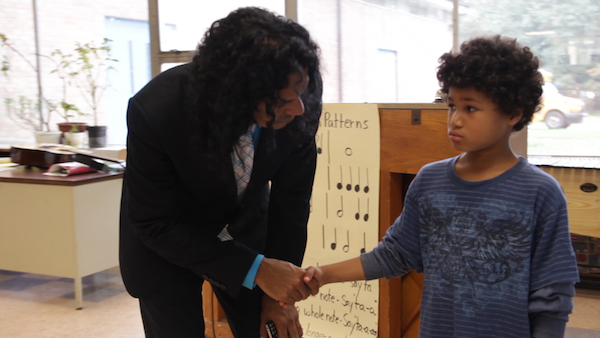Opening virtually after touring festivals in 2017, My Name Is Pedro is a bare-bones, unprepossessing documentary about Bronx-born educator Pedro Santana. Making her feature documentary debut, director Lillian LaSalle takes a narrowly focused story and connects it to larger themes that affect everyone. It’s an emotional journey that hits uncomfortable truths.

La Salle begins with a turning point in Santana’s life as he prepares for a benefit in Nyack. In direct interviews and archival footage, Santana then delivers a passionate, fast-paced, often hilarious account of his life. Whether driving a car (and getting lost), pacing the hallways of elementary schools, or prowling through his house, Santana operates at warp speed, spilling out a barrage of details about people, places and events.
The documentary also follows Santana at work, and it’s here, in hallways and classrooms, in parking lots and apartments, that the movie dazzles. Santana clearly loves his work, but more important, he seems to have a primal connection to students. He talks to them as individuals, not statistics, and he backs up his advice with hard-earned life lessons.
Like the fact that he was once a special ed student. “I needed help,” he confesses to a bunch of kids in a library. His elementary school teacher Yvonne Torres recalls how Santana struggled to learn. That empathy enables him to draw in other troubled students.
This is a warts-and-all portrait. Not everything Santana does or says feels right, and it’s easy to see how he turns some people off. He can be a polarizing presence, as a profile in The New York Times “Metropolitan” section shows. When he gets into trouble, it becomes clear that he has made genuine enemies.
The camerawork, credited to a half-dozen cinematographers, is remarkably intimate, sticking with Santana through extremely difficult moments. LaSalle employs simple line-drawing animation by Antony Barkworth-Knight to cover material that couldn’t be filmed. But there’s no denying this is a small-scale, low-budget endeavor, a labor of love that at times veers on hagiography.
Don’t be fooled. Just when you think you have the documentary pigeonholed, an unexpected twist will pop up. My Name Is Pedro eventually brings viewers to a school board battle, with the kind of deadly dull budget debates that fill the pages of community newspapers.
But in LaSalle’s hands, the fight between parents and the East Ramapo Central School District becomes a fascinating account of how the will of the people can be thwarted, how easily democracy can be throttled. In today’s climate, it’s a lesson that can’t be emphasized enough.

Santana’s life takes disturbing turns. And yet LaSalle keeps pulling rabbits out of her hat. She includes a long, digressive story in which Santana jokes with kids about animal feces before segueing into his experiences in the Peace Corps in Africa. In a heartbeat he goes from clown to philosopher, giving his students a life-or-death dilemma to contemplate. If only every child could be exposed to teaching like this.
My Name Is Pedro opens in virtual theaters New York City on September 17 (Maysles Cinema) and Los Angeles on October 2 (Laemmle), followed by Philadelphia (Film Society), Buffalo (North Park), Baltimore (Senator, The Charles), Vancouver (Kiggins Theater), Tucson (Loft), Cleveland (Cleveland Cinemas), Phoenix (Film Bar), Bellingham (Pickford Center), San Jose (3 Below Outdoor), Winston Salem (Aperture Cinema), and Tampa (Tampa Theater).


